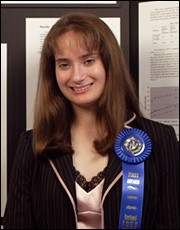When Competition Doesn't Turn Out the Way You Want
An interview with Amber Hess.
Strangely enough, the science fair Amber learned the most from was her first trip to the California State Science Fair (CSSF) in seventh grade—where she did not win anything. Her teacher had been kind enough to take her display board over to the regional fair. By pure luck, she was chosen as an alternate for the state fair, and someone who qualified for state dropped out. "I thought to myself, why not go? Who knows...it could be fun. At that point it was all on a whim—I was not serious about going to the science fair and winning something. I just thought I would try it," she said. Although Amber did not place at CSSF, she was determined to come back the next year and try again. "It had been so much fun to participate and meet the other students, plus I really wanted to win."
After emailing her judges from the state competition, she realized that in order to have a chance, she needed to not only understand her project well, but also the theory behind her project (i.e., how and why her experiment worked). As an 8th grader she did a relatively simple chemistry project, but she studied the molecular structure of the acid she was examining, learned about chemical bonding, and practiced answers to questions the judges might ask her. Additionally, Amber wrote up a short introductory speech about her project and practiced it so often the words became automatic. "In seventh grade I used note cards so I wouldn't forget my main points—bad idea," she points out. Practice, which led to memorization and thorough understanding of the project, worked much better. She even had a couple local scientists stop by the house to interview her in mock judging sessions. All her work paid off—she won 1st place in junior division chemistry. "I've found there is actually a lot of strategy to winning. There are many things you can do to improve your chances," Amber says.
Amber also gained experience from her first participation at the Intel International Science and Engineering Fair (ISEF), where she won a special award from Kodak, but was disappointed not to win a more prestigious Grand Award. "It's funny how I've learned the most from the fairs I have done the worst at. From my first time at CSSF I learned that science fairs were fun. From all the friends I made at ISEF, I learned that it is actually cool to apply science to everyday life. You don't have to look nerdy to enjoy science outside of the classroom. If you think science is just for geeks, think again. I've met so many cool and amazing people from science fair competitions." ISEF was so great that Amber wanted to compete again the next year, but at her regional fair she was beaten by another junior (who, amusingly, has become a close friend). Working over the summer, she improved every aspect of her project. With hardly any computer programming experience, she wrote a program to help analyze results. Yet again, her work paid off. At her regional fair, both she and her friendly competitor qualified for ISEF. Before going to the international fair, she continually added new parts to her project. In addition, she looked at the ISEF judging score sheet (available online at the ISEF website), which explained what the judges were looking for. "I went through the list and made sure to hit upon each category in my presentation, sometimes multiple times," she told us.
"I just wanted to win something, so you can imagine how ecstatic I was when I won a First Place Grand Award." But she made sure to point out: "Winning isn't everything. I've learned so much science from my projects, and I value the friendships I have made above all my awards. Science fairs used to be a great way to enhance my high school resume for college admissions, but I have found a passion for science I would not otherwise have. Before these competitions, I probably never would have chosen science as a career, but now I am almost positive I will do something in science or engineering. Most people think science competitions are boring and really geeky, but they are actually quite fun, which is why I compete. The times I spent at these competitions have been some of the best days of my life. Only after my first trip to ISEF did I appreciate all of the other things I gained from science fairs. If you are fortunate enough to win, it is just a bonus." Amber wants to share her knowledge with other students so they can experience the same exhilarating events. She hopes the pages she has written for Science Buddies encourage students to participate in science fairs. One of the major articles Amber has written for Science Buddies is "Tips for Science Fair Success." Seeing how successful she has been, you might want to take her advice.





